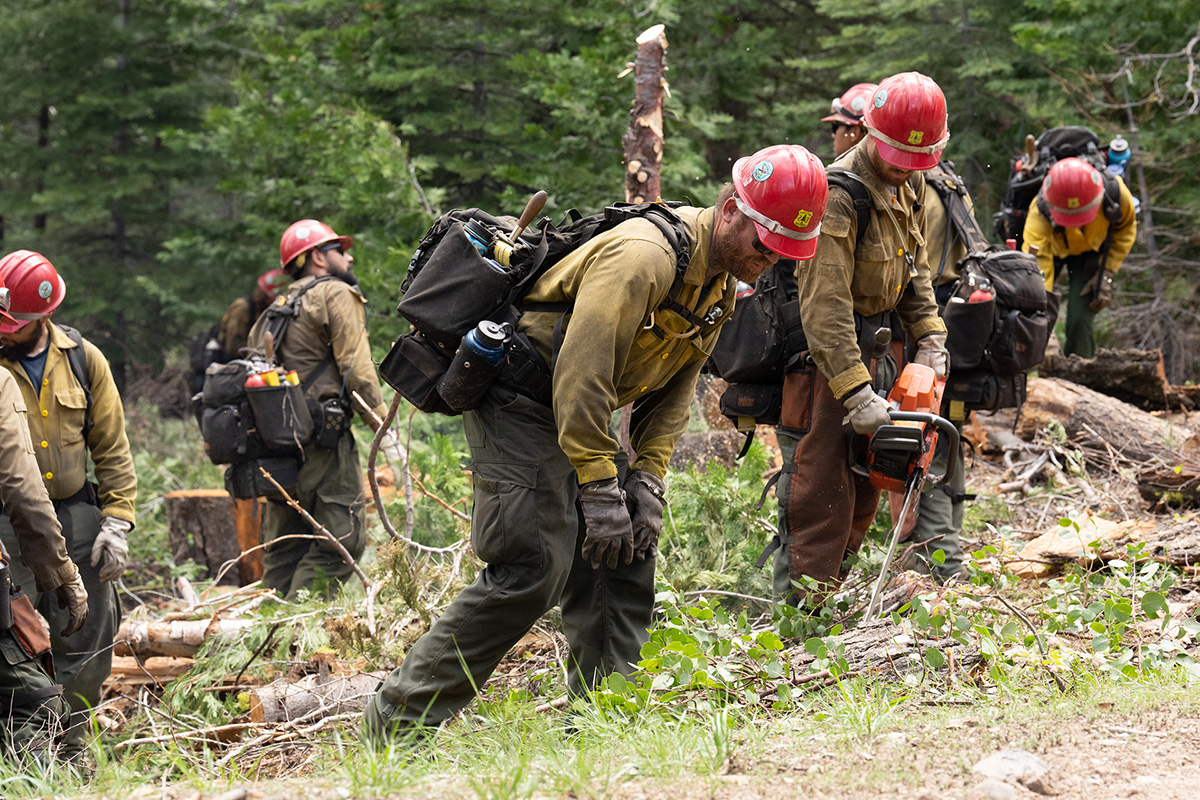A childhood dream ignited.
Matthew Rau was five years old when his family moved into government housing at a U.S. Department of Agriculture’s Forest Service ranger station. Some of his earliest memories are waking up in the mornings and seeing wildland firefighters exercising around the compound. He studied their work ethic and camaraderie and knew from that young age he wanted to be part of it. It was his path.
“What I saw in those folks I wanted. I wanted to have fun. I wanted that cohesion, and I truly just believed in the agency,” Rau recalled.
His mother, who worked on the Lower Trinity Ranger District of the Six Rivers National Forest in California, was a major source of inspiration. Rau remembers her returning from fires with leftover C-rations, tins of crackers and canned meats often found in firefighters’ packs. He would devour the pre-packaged food while looking at his mother’s pictures from the fire line. Not many kids could resist that sense of adventure.
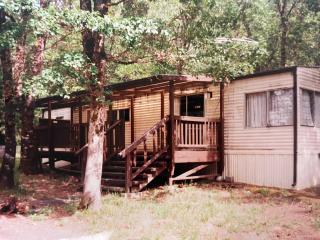
After school Rau would walk over to the ranger station while he waited for his mother to finish work. He clearly remembers the garage was always the most active. Sometimes he swept floors or organized tools. He learned to roll hose on the fire trucks. His interest quickly became his first summer job.
As Rau grew more independent his mother worried about him staying home alone during fire season. She never knew when she would be away to fight fires, and his dad was a logger at the time. Despite having a tight-knit community of support, she worried that, like most young boys left unsupervised, he would find trouble. So, at age 12, he started his career in the Forest Service as a volunteer, cleaning campgrounds all summer.
Following footsteps, forging paths
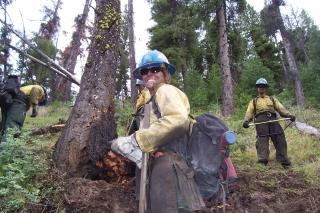
It wasn’t long before Rau followed in his mother’s footsteps, working his way up through jobs in wildland fire. But it was those early years that shaped him. He didn’t have specific career aspirations—he just wanted to be part of the organization. Growing up surrounded by the Forest Service instilled a lot of his values and morals. But even today, it is his mother who continues to inspire him.
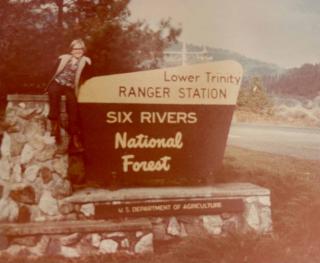
“If I can in some way pay forward that inspiration my mom gave me and be even half the leader that I saw my mother be for her co-workers, then I will have done myself and this agency a service,” he said.
Rau, who is now the fire staff officer on the Cibola National Forest and Grasslands in New Mexico and incident commander of a Southwest Complex Incident Management Team, never imagined being where he is today. But he had mentors and leaders that believed in his abilities along the way. Moving from fire operations to management, he now focuses on providing that same support to the next generation of fire managers.
“I don’t feel like anybody works for me,” he said. “I’m working for them, to help everthem understand what they need to be successful and what I can do to improve not only their work environment, but also their overall quality of life.”
Today, Rau works in programs that span the world of wildland firefighting, from training new firefighters to operate wildland fire engines to advising advanced agency administrators who are the responsible officials during wildfires. His involvement is rooted in his core value of service. Training others to serve, whether on the ins and outs of working on fire engines or how to help federal officials make difficult decisions during complex wildfires, for Rau is a way of taking care of people.
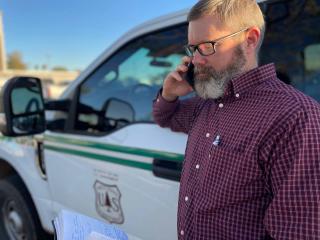
He explained, “During major incidents there is a lot of uncertainty and there is a lot of fear. Being able to come with a team to help community leaders make the best decisions for the situation is all about serving people.”
The weight of trauma: coping with post-incident stress
Amidst the adrenaline-fueled rush of managing wildfires, Rau acknowledges a quieter struggle—a struggle against the mental toll of the job. For him and countless other firefighters, the rapid transitions inherent in their work can create unique challenges.
"The bonds that I make with people during an incident response are fast and they’re deep because it has to be. You must build that trust rapidly and you must immerse yourself in those problems that weren’t yours just 24 hours earlier," Rau remarked.
However, transitioning back to normalcy can prove challenging. When the assignment is over, firefighters are plucked from that intense situation and move on to a new emergency or back to their home life. It can be difficult to leave behind people you’ve helped, knowing they are left in the aftermath. Rau has worked a lot on trying to “turn off” work over the years. Like many other firefighters, he feels like he’s expected to come home, put the wildfire behind him and be a spouse and a parent, and help with laundry, homework and the things that piled up at his day job.
“After you get home, it’s not easy to stop thinking about what you could’ve done differently or if you should’ve helped more,” said Rau.
These transition periods can feel insurmountable, leading to a relentless loop of self-reflection and self-judgement. Rau himself recognizes the struggle and shared insights into the pervasive nature of post-traumatic stress among firefighters.
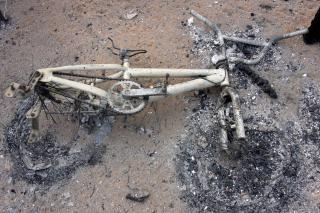
"Every incident we go to is a traumatic event in some way," he says, highlighting the enduring impact of the job on mental well-being. Tragically, the toll extends beyond the confines of the fire line.
Rau has seen first-hand how the job can take a massive toll on people. He recalled an employee who was struggling with personal problems. After Rau spent a year trying to get them help, their job performance still wasn’t improving so they were fired. It took a lot out of Rau personally and he hesitantly shared that there was a sense of relief when the employee was gone. Then about two months later, he received word that the person died by suicide. It devastated him.
“There had to be more I could have done. I don’t know exactly what I should have done, but there certainly must have been more I could have done in that situation,” Rau reflected. Still over a decade later, he carries this with him, and it has shaped his approach to leadership.
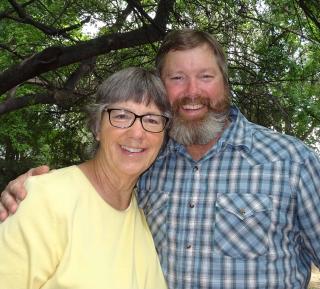
Rau's personal experience with the loss of a colleague underscores the gravity of the issue. The Centers for Disease Control says first responders are likely at an elevated risk for suicide. For any firefighter that has known a colleague who died by suicide, it casts a shadow over an already challenging landscape, something Rau describes as a crisis.
“It’s not an easy fix, it’s not an online training or an informational hand-out,” he said. “It’s an everyday thing that we all must focus on,” he added, driving home the urgent need for comprehensive support systems.
Without clinical support, many first-responders find trauma difficult to process especially because they are often away from their families and support networks, working long hours and continually in stressful environments. One coping mechanism in firefighter culture is to go drinking together after a tough assignment. It can be part of the healing process. But Rau has learned using alcohol or drugs to cope with trauma doesn’t just numb that post-traumatic stress. It numbs everything, detracting from the quality of relationships with children, family and loved ones. It is part of the wildland firefighting culture that Rau believes needs to change and a concern that federal agencies are paying close attention to.
And amidst this darkness, glimmers of hope have emerged. The Forest Service, in collaboration with the Department of the Interior, launched programs aimed at bolstering mental health resources for firefighters. These efforts prioritize access to culturally competent clinical care and provide vital education and support networks. For Rau and his peers, this is something that has been missing. The hope is to have better access to care that can provide firefighters the resources they need to stay healthy socially and psychologically. This will allow wildland fire culture to evolve.
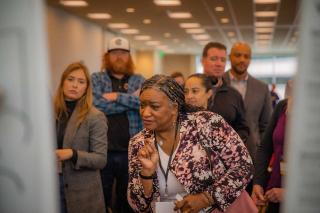
Navigating the firefighter lifestyle
Changing the culture isn’t easy. For years wildland firefighters have tried to figure out how to improve their relationship with their work. Firefighters are generally programmed to completely give six months of their lives each summer to the job. Rau was raised in that culture of having your bags packed, ready to go at a moment’s notice and sending regrets for missing birthdays, graduations and anniversaries. He hasn’t known many firefighters who intentionally take summer vacations with their family, but he does – he schedules a full two and half weeks of vacation no matter what is happening at work.
“I’ve heard too many people regrettably say, ‘My kids are grown now, and I never took a summer vacation with them,’” Rau said. “I’m not willing to let that happen to me.”
It is important to Rau to not only spend quality time with his family but also model for others a healthy relationship with work. He wants to show younger firefighters that they can do this job and have a family. As the Forest Service converts more temporary firefighter positions to permanent, Rau believes the culture around work-life balance is slowly changing.
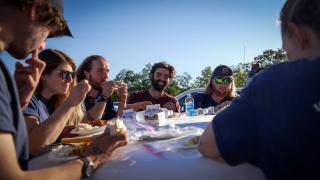
“We don’t have fire seasons anymore, we have fire years, and we need to build our workforce accordingly,” said Rau. “Young people looking at a firefighting job and trying to start a family need to be able to see that this is a great career that fits with their life,” he added.
Increasing firefighter pay and creating the new firefighter series helps, but large cultural transformations take time – something Rau thinks is worthy of his patience.
Rau’s belief in the Forest Service and the people he works with are what keeps him motivated, as well as the thought that someday his children might continue the family legacy that his mother started by choosing a career with the agency.
“I still love the agency and what we’re doing and if any one of my kids said, ‘I want to be in the Forest Service like Grandma, Mom and Dad,’ I would be the proudest parent,” he said.
If you or someone you know is experiencing suicidal thoughts or a crisis, please reach out immediately to the Suicide Prevention Lifeline by calling or texting 988.



